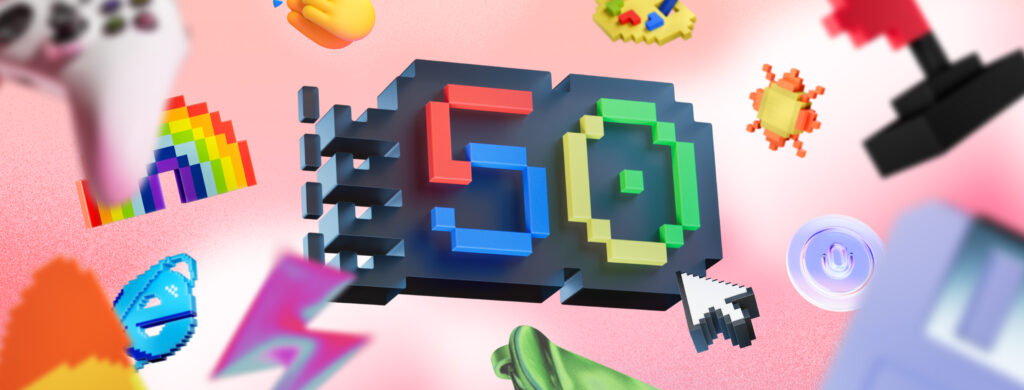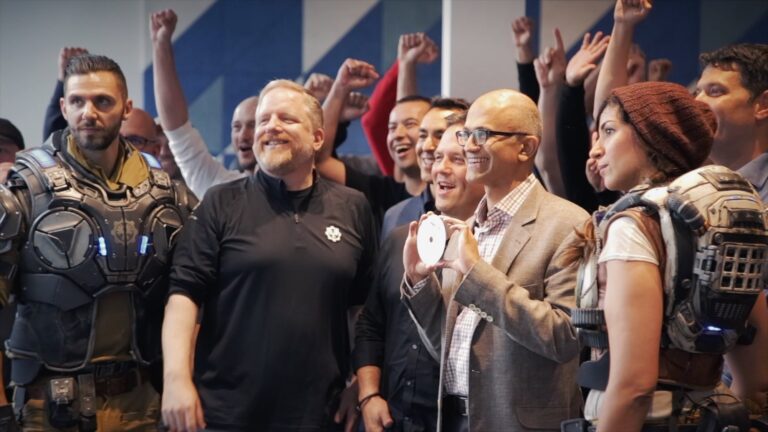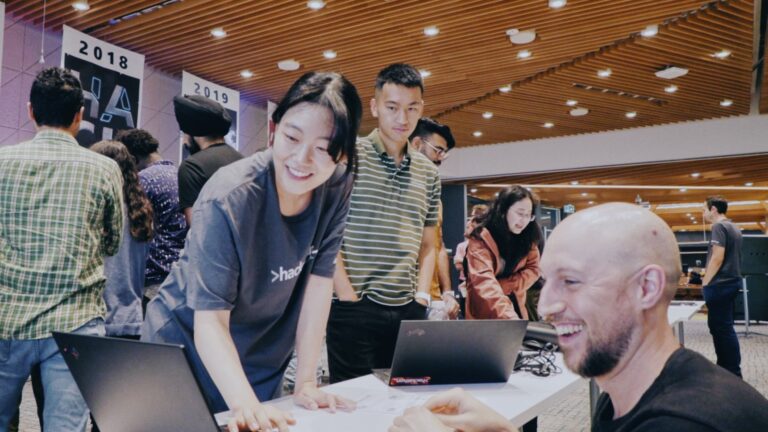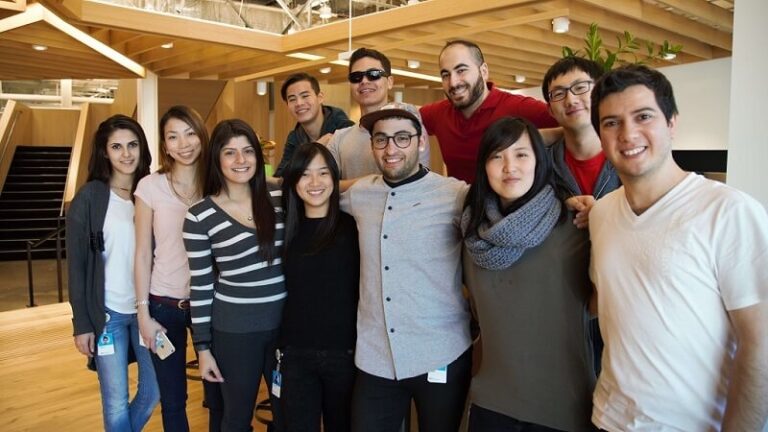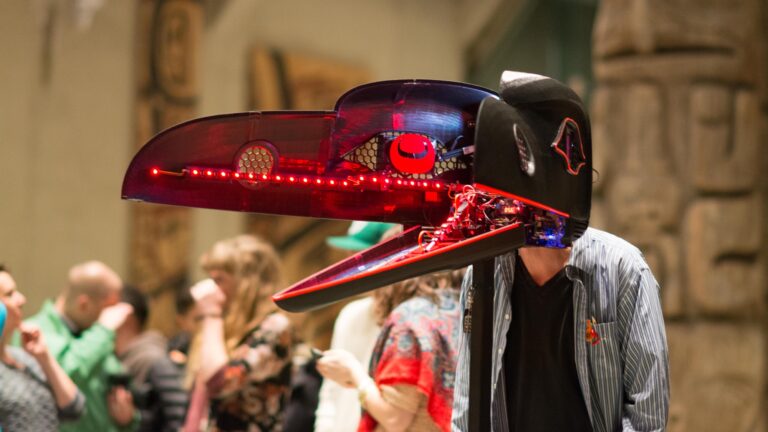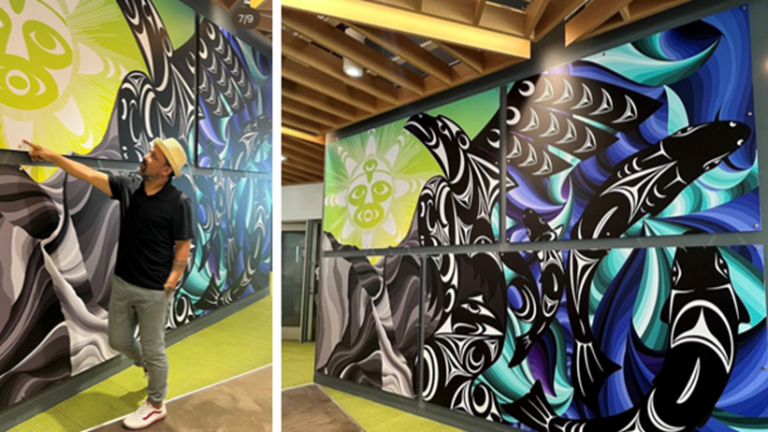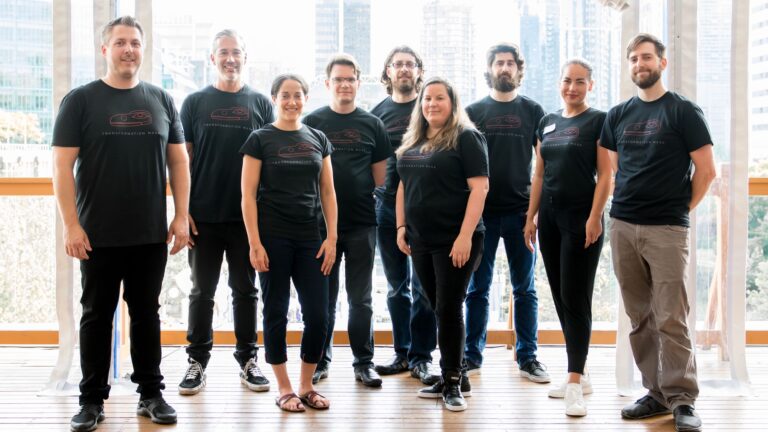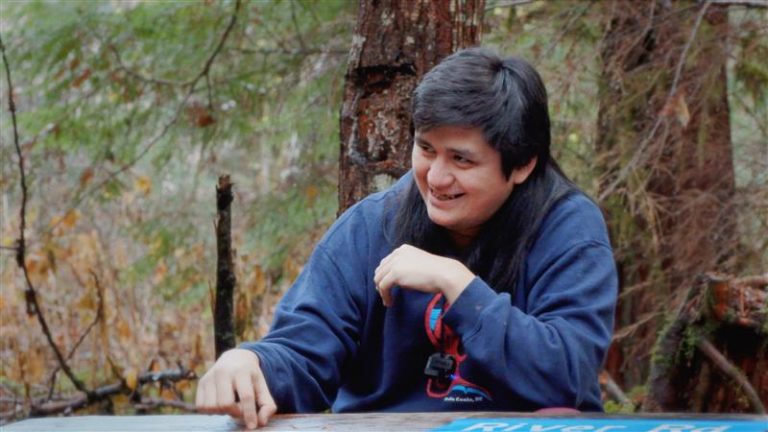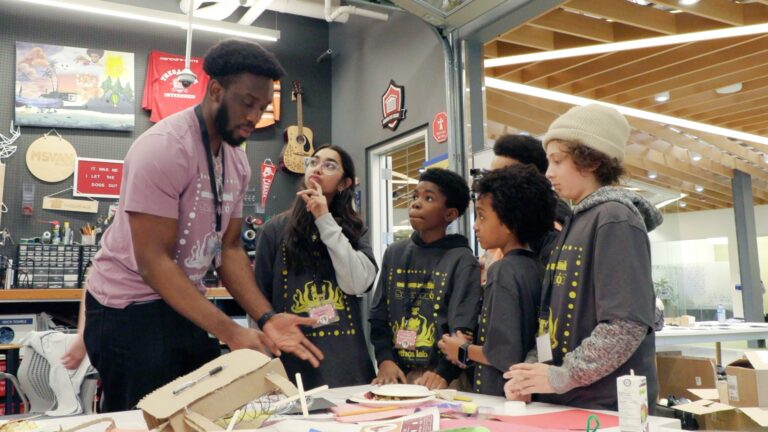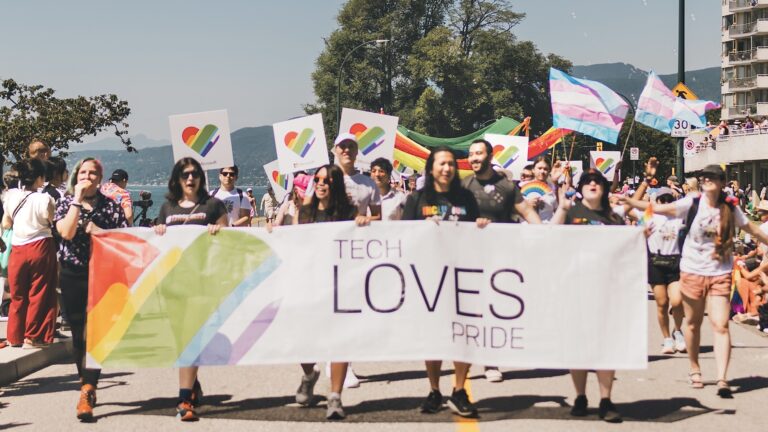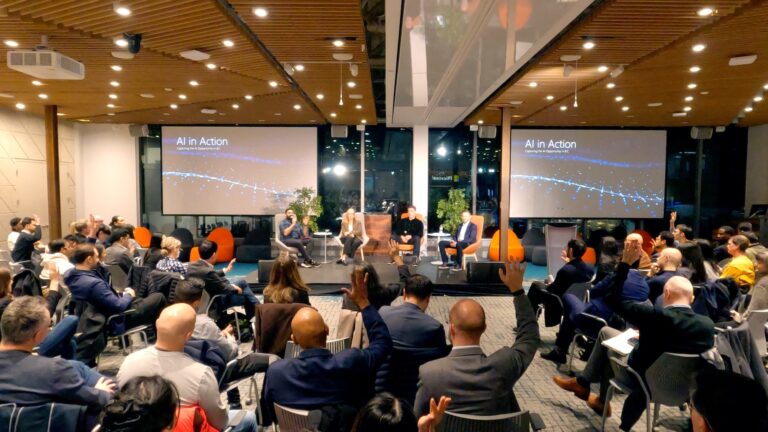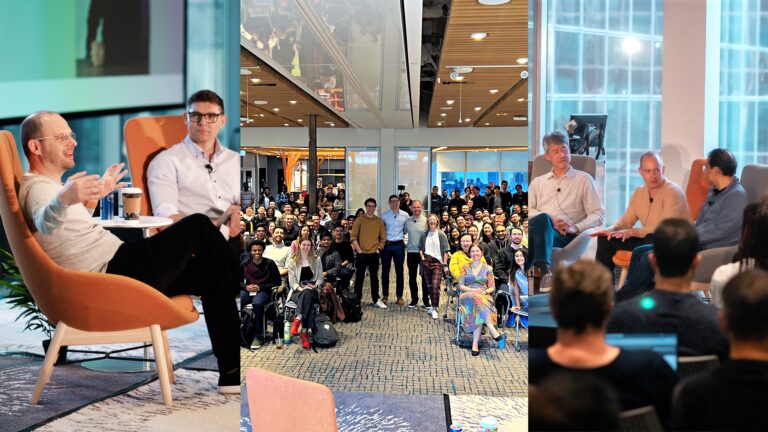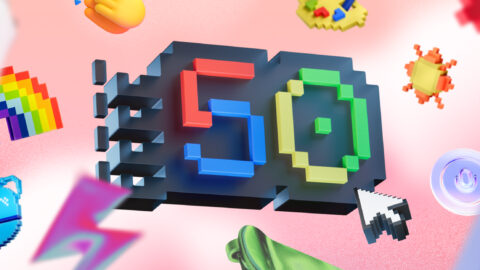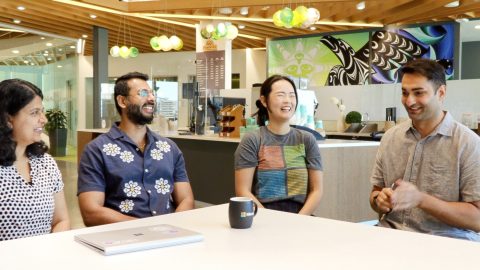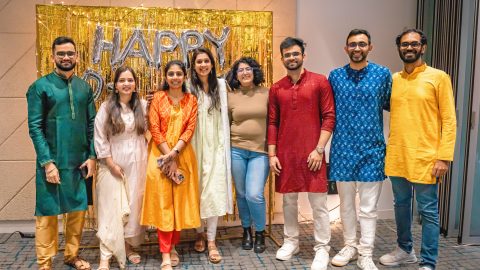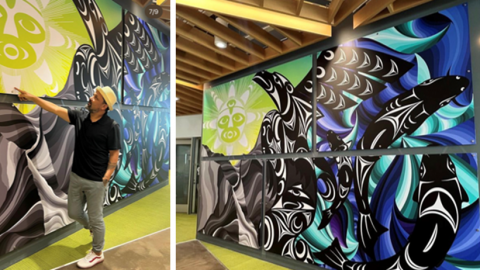Celebrating Microsoft’s 50th from Vancouver
Microsoft just turned fifty – and milestones are meant to be celebrated. So, let’s roll the tape.
Microsoft Canada was established in 1985, opening the first engineering site in the country in Metro Vancouver in 2008. Game development (a hallmark sector for the city) provided early growth, paving the way for expanded investment less than a decade later.
In 2016, the company opened the Microsoft Vancouver (MSV) Development Centre at the corner of Granville + Georgia. Welcoming Prime Minister Trudeau, Premier Clark, Mayor Robertson and Brad Smith, Microsoft’s Vice Chair + President, the moment was catalytic – for us, and for the region.
Microsoft is a founding partner of the Cascadia Innovation Corridor – an initiative led by Challenge Seattle and the British Columbia Business Council (BCBC). With a focus on building a sustainable mega region that connects British Columbia, Washington and Oregon, Cascadia is set to grow more than 30% by 2050.
In a recent interview with the Seattle Times, Brad recalled the potential he’d seen for Microsoft at the time – bolstering innovation throughout Cascadia in the same way they’d transformed the Seattle area. We could enable cross-border research, support major projects including a high-speed rail system to connect Cascadia’s cities, and we could leverage tech talent in Vancouver.
“For many years, most of the R&D happening in Vancouver was in gaming,” recalled David Seymour, Vice President, Office Product Group Next AI Lab, and General Manager of the Microsoft Vancouver development site. By 2016, things were starting to change.
As leading universities like UBC and SFU began attracting more students and generating skilled tech grads, Vancouver’s startup industry was also becoming more dynamic, enriching well-established talent pools in animation and interactive technology.
Smith, who serves as Executive Sponsor for MSV, seized momentum around its opening to establish new product development in the city and build Microsoft’s profile as an engaged anchor company.
“It was a big moment – the opening of the new site gave us room to double in size, creating four hundred additional jobs for British Columbians,” recounted David. “I had no idea that we would end up being more than five times that.”
Today, Microsoft’s development workforce in Vancouver comprises over 2700 employees with representation across Experiences + Devices, Cloud + AI, Security, Microsoft AI, Gaming, Microsoft Research, Azure, and Customer / Partner Solutions.
David, who’s originally from Winnipeg, moved west in 1998. “I was a real Microsoft fan boy – Microsoft Windows NT 3.5 was my jam, [and] I was a Microsoft Certified Professional,” he explained. “There was a game studio at UBC called Big Park that had just been acquired by Microsoft and that was the ticket for me.”
He’s been at MSV ever since. Now, as General Manager, he works with Brad Smith and other Microsoft stakeholders on all things Vancouver – from employee experience to regional impact.
The Granville grand opening coincided with broader organizational change. Satya Nadella had established a culture of growth mindset and established a new outlet for innovation – the Microsoft Garage. Vancouver was the third maker space for the company and has been a source of countless achievements over the last decade.
In 2016, Microsoft Vancouver Garage interns created the prototype for Seeing AI – a research project that aimed to help the visually impaired better navigate the world around them. Later that year, the interns watched Satya stand on stage at Microsoft Build and demo the application.
Around the same time, a Vancouver hack team created Learning Tools – a set of tools that helped users improve reading, writing and comprehension – and captured the Global Hackathon Grand Prize. The product, initially built for the Office 365 and Edge applications, went on to become the foundation for Reading Coach – a free tool from Microsoft Education that helps students improve their reading fluency through AI-powered stories and personalized practice. Microsoft EDU team members continue to work on this and other impactful educational tools out of the Vancouver site today.
Described as a ‘playground for your passions’ by first Vancouver Garage Director, Stacey Mulcahy, the space is the embodiment of Microsoft’s mission: empower everyone to achieve more.
“It’s a mindset,” said John Westworth, current Director of the Vancouver Garage. “Things like curiosity – asking ‘what if’ and ‘how might we’. It’s about being creative… but the final piece really is about courage.”
Whether it’s a data scientist bolstering communication skills in by presenting their Hackathon project, a software engineer increasing cross-disciplinary collaboration by joining a design thinking workshop, or a product manager boosting productivity by attending a deep dive on Microsoft Copilot, the Garage empowers everyone at MSV to be a ‘learn-it-all’.
The impacts are tangible. “Everybody really cares,” expressed John. “They care about the work they do, and they care about the wider community in Vancouver. You can feel this camaraderie in the building.”
As a global company, we seek to create regional impact. We’re empowered by Microsoft’s belief in the power of partnership – and that no one person, company or government can solve the world’s problems alone.
Our commitment to this approach extends beyond our office walls. Over the years, we’ve supported innovation in our region, with projects engaging partners across the academic, industry and non-profit sectors. The impacts of some are exponential and ongoing.
Back in 2018, a group of developers teamed up with Heiltsuk artist, Shawn Hunt, on Transformation Mask – a mechatronic mask based on Shawn’s designs, 3-D printed in the Vancouver Garage, and incorporating a holographic audio-visual experience.
Andy Klein – Principal Designer within Dynamics 365 Business and Industry Copilot who joined MSV around ten years ago – was on the team. He and his colleagues presented the piece in art galleries and museums across the Lower Mainland, and then at SIGGRAPH – the world’s premier computer graphics conference. He values the connection the experience offered and the growth it fostered for him as a Designer.
Partnerships like this one helped lay the foundation for how Microsoft Vancouver would approach regional impact, and also, engage directly with Canada’s Truth and Reconciliation Commission Call to Action #92 – Business and Reconciliation.
In 2021, we partnered with the First Nations Technology Council (FNTC) on Moving Beyond Inclusion – a pilot project designed to decolonize corporate systems and transform the innovation, technology, and technology-enabled sectors through actions grounded in Reconciliation with an Indigenous lens.
Our partnership has since evolved and continues to inform our reconciliation commitments, from collaborating with Squamish-Haida artist, Cory Douglas, on a Land Acknowledgement mural at our flagship office, to partnering with the Nuxalk First Nation to enable culture and language learning through technology.
The employees who’ve leaned in are among those impacted.
“As things evolve, and I look forward to the opportunities for impact our technologies offer, I draw on my experience building Transformation Mask,” shared Andy. “We applied what was emerging technology at the time to a creative endeavor, and I can’t help but wonder how technologies like artificial intelligence will continue to breathe new life into old ways of doing things.”
SIGGRAPH is returning to Vancouver this year, and Andy will be there too – this time, as a Judge.
“I’m really proud of our track record of community engagement,” noted David. “It’s been incredible to witness our regional partners, like Ethos Lab, scale alongside us.”
The partnership with the organization, a Black-led innovation hub which offers STEAM programs for youth, began in 2019. Ethos Lab empowers youth to transform the culture of innovation and increase representation in technology spaces.
In February of this year, we hosted their flagship event for the second time – a Black History Hackathon engaging 150 youth from across Greater Vancouver. This year, we were thrilled to leverage a connection through our peers at the Atlanta Garage to bring in keynote speaker Brandon Sadler – artist and set muralist for the Black Panther films.
To date, over forty MSV developers have participated in the event as youth mentors. “We always have people who are willing to put their hand up and say, ‘I want to participate – I want to support,” said John.
“And that rings true for all of our partners across the region,” added Pamela Saunders, Site Director for MSV. “We want to see British Columbians at the forefront of AI leadership.”
“We work with the BC Business Council, the Greater Vancouver Board of Trade, and with Invest Vancouver,” included David. “And we’re always here to give advice and to run workshops or talks for BC businesses navigating digital transformation.”
Microsoft is made of change makers.
“Vancouver is an amazing place for young developers to be innovative,” emphasized David. “We have a rich community with diverse skill sets.”
In the early weeks of 2025, we asked Vancouver managers to nominate emerging leaders who live growth mindset for an employee recognition campaign themed around our company’s 50th anniversary.
“I think change is a byproduct of solving problems,” said Max Marchant, a Product Manager working on integrating Copilot into Microsoft Teams’ services.
He and his peers are emboldened by Microsoft’s five decades of innovation, but they’re focused on what’s ahead.
“My first interaction with Microsoft was using MS Paint when I was five or six years old,” noted Arjun Swami – a software engineer on the IC3 Messaging Conversation Service team who joined Microsoft in Vancouver four years ago. “And now I get to empower people while supporting critical business operations on a global scale.”
Last fall, a feature he’d worked on – the new chat and channels experience in Microsoft Teams – was announced at Microsoft Ignite.
“Innovation doesn’t exist in a vacuum,” expressed Liza Rudakova, who joined Microsoft Vancouver out of university five years ago and was recently promoted to Engineering Manager.
They understand the opportunity for global impact that AI provides – for them as developers and to solve problems for our customers.
Our tenured folks feel the same way. “Each change has brought new challenges and new opportunities for us and for our customers to leverage technology in more and more natural ways,” shared Andy.
“In this moment of AI transformation, there’s never been a better time for young developers – all our staff – to lean into AI-forward, model-forward development. The kind of impact a team can have now is scaled many times with the potential of AI,” expressed David. “It’s really, really exciting stuff people are working on.”
The innovations we’re developing today will define the next five decades. And we remain focused on translating innovation into enduring value for our customers. This felt more tangible than ever on April 4th as we celebrated Microsoft’s 50th anniversary alongside peers in Vancouver and around the world.
“To see how far we’ve come since MSV’s first YouTube video – Welcome to Vancouver – the careers that people have built here, the experiences they’ve had, and the places they’ve taken them is so impressive and exciting,” noted Pam.
As we look to the future, our mission remains to empower every person and organization, and our success hinges on how we harness AI and other technologies to amplify human achievement and create positive change for society.
“When I think about what the next fifty years are going to bring the company, I think about the role Vancouver plays and about the people that are here,” furthered Pam. “In 2016, we hit the ground running, and we’re ready to do it again.”
Welcome to Vancouver – we’re engineers, designers, managers, interns, leaders, learners, problem solvers and collaborators. We’re Microsoft, and we can’t wait for what comes next.
MSV Change Makers
“They can learn from each other and build their careers.” – Pamela Saunders on the next generation of Microsoft Vancouver developers.

